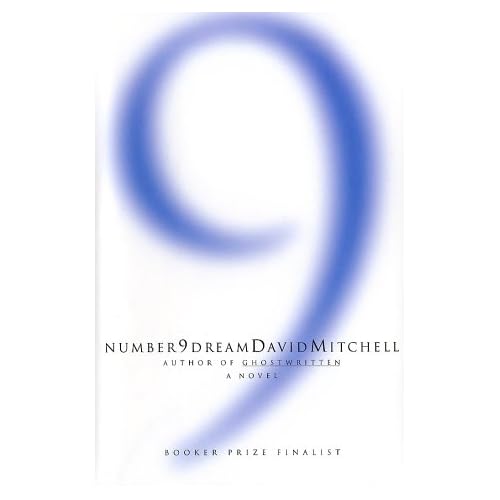Review: Number 9 Dream

Number 9 Dream, by David Mitchell
8.5/10, a surreal multi-layered coming-of-age adventure
The beginning of "Number 9 Dream" is tough to get into. Eiji Miyake, a young man in Tokyo for the first time, is searching for clues to the identity of his father, but sorting out his fantasies from reality is challenging; like the flood that overtakes him (or does it?), we are plunged into his narrative with little preparation or context. But the story eventually sorts itself out, the magical realism elements fall into their place, and Eiji's story moves along.
Each of the first eight sections of "Number 9 Dream" is split between the present day narrative and some other narrative, whether youthful fantasies, dreams, letters or memories from the past, or something else. In most cases, the "background" narrative provides support and foundation for the ongoing one. In a couple of the chapters, the foreground narrative actually becomes more bizarre than the background. Through all of it, Mitchell explores the lines of reality and fantasy, desire and expectation, promise and hope with all the skill you'd expect from his other works.
One of the reasons I think he likes to play with split narratives ("Black Swan Green" is his only single-narrator book) is that he is so good at character voice. Eiji has a distinctive voice, but so do his fantasies, so do the memories and the other characters he encounters, and so, in fact, does each setting he passes through, from his job at the train station to the gleaming corporate tower where his father's attorney works to his filthy apartment with its transient feline roommate to the countryside where he grew up.
If there is one flaw in "Number 9 Dream," it is that, being used to Mitchell's transcendant endings, the finale of this one does not quite measure up. Either it requires a bit more study and thought than I've put into it, or it simply leaves the narrative somewhat unresolved--which, given the rest of the story and the style, is fine. I'm not sure what I was expecting, only that "Ghostwritten," "Cloud Atlas," and "Black Swan Green" all had terrific endings, with "Cloud Atlas" and "Black Swan Green" among the best in modern fiction.
Still, as with a few creators like Kazuo Ishiguro, Pixar, and the Beatles, the weakest of Mitchell's books is still a delightful, thoughtful experience, well worth picking up and enjoyable from beginning to end. Its complexity makes it probably the first of his books I would want to re-read, if only because of the feeling that there were connections between the various parts that I'd missed. If nothing else, it's instructive to see him develop the techniques that allowed him to write "Cloud Atlas," and to see parts of the stories begun in "Ghostwritten" continued here.

No comments:
Post a Comment